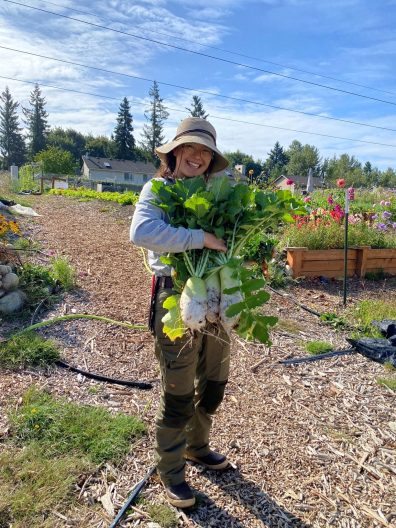UW Farm Weekly Dirt: UW Farm Catalyzes Careers in Urban Farming
One of the best responses I’ve gotten after telling someone I’m a farmer is: “Are you okay?” And it is a fair question, though the answer changes based on what time of year it is. There’s the unbridled optimism of early spring, the growing suspense in April and May (what weather-related surprises will climate change bring us this year?), staring into the void in June, and then summer hits and the rest of the season is a downhill run. By Thanksgiving, I’m ready to give it all up, try my hand at an office job and start grousing about emails instead of my aching joints. But lo and behold, when February rolls around and I’ve spent a couple months leafing through seed catalogs with my tongue hanging out, I find myself getting riled up about the coming season.
How did I, a former middle-of-the-road UW student with no interest in manual labor and a degree in something science-y, end up here? I blame our favorite farm manager Perry Acworth. I started hanging around the UW Farm, hoping I’d discover my life’s true purpose somewhere in those twenty foot tall piles of wood chip mulch. After about ten months of helping students with their on-site projects, taking a permaculture course, and learning all sorts of things about the wonderful, complicated world of fruits and veggies, I realized that my days on the farm were marked with the sort of excitement and eagerness to learn I hadn’t experienced in years.
The More I Learned, the More Invested I Became
What really struck me was the interconnectedness of it all.  Science! History! Social justice! While we weeded, seeded, and transplanted, Perry made sure to emphasize the importance of understanding why we’re growing food and where it is going. The more I learned, the more invested I became.
Science! History! Social justice! While we weeded, seeded, and transplanted, Perry made sure to emphasize the importance of understanding why we’re growing food and where it is going. The more I learned, the more invested I became.
Eventually I decided it was time to try doing it for money, and the experience I gained at the UW Farm helped land me an apprenticeship at a cattle ranch in California. This deepened my understanding of the intense injustices in the food system, particularly when it comes to labor conditions for farmworkers, and food insecurity in rural communities. After returning home to Washington, I worked at a production farm growing vegetables, dyes, and caring for wool sheep, and then spent a season at a farm run by a coalition of food banks in south King County. Through these jobs, I’ve gotten to know farmers, scientists, educators, and organizers (many of whom are all four) who work tirelessly to better our food system.
My Advice for Aspiring Agriculturalists
If I can offer any advice to aspiring agriculturalists out there, it is to cherish the interactions with mentors, coworkers, and fellow farmers. For better or for worse, farming attracts all kinds of folks who come from a wide variety of beliefs and backgrounds. I have had so many fascinating, challenging, and educational conversations that continue to shape who I am on and off the farm. I never could have imagined that my life would turn out the way it has thus far, but I am grateful for the time I had at the UW Farm for acting as the catalyst for my current journey.